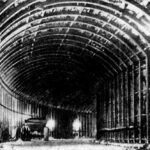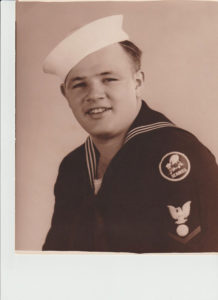James Rada, Jr.
The Catoctin Banner presents a continuation of fiction serials for your enjoyment. “Cast from the Gods” is a new, original serial set at Site R when it was under construction. Let us know what you think.
7: The Burial
Ancient Indians had killed the creature from the metal box once. The U.S. Army would have to do it this time. But had the Indians killed it centuries ago, or had it just been dormant for centuries? When the work crew digging under Raven Rock Mountain found the metal casket two days ago, nothing but bones had been inside. Now, those bones formed a living monster that had killed four soldiers, and that number might rise exponentially.
Exploding Molotov cocktails had hurt it, but it had recovered from the fire. Now, Maj. Henry Owens had no more bottles to use as bombs. Bullets slowed it down but didn’t stop it. If the creature reached the tunnel entrance and broke containment, there might be no stopping it.
The creature moved forward, swatting at the bullets as if they were annoying gnats. Owens could see the bullets tearing away bits of flesh, but most of the wounds glowed blue and healed themselves.
It would make it to the entrance.
He looked around, wondering if he could bring in more equipment to block the entrance further.
He saw the five-gallon cans of gasoline, but he had no bottles to fill with gasoline. He could use one as a bomb, but it would be too heavy to hurl accurately. The creature would have to come to the can. That wouldn’t happen. It had no reason to, especially if it saw a burning fuse on the can.
Owens ripped off his shirt and pulled his undershirt off. He twisted the shirt into a thick cord and laid it on the ground. He grabbed one of the gas cans and doused the twisted shirt in gasoline.
Owens ran to the nearest Jeep. He unscrewed the gas cap and pushed the shirt into the Jeep’s gas tank. Then he splashed the rest of the gas in the tank over the Jeep.
“Fall back!” he ordered his men.
The soldiers continued shooting as they moved backward. Owens crouched behind the Jeep. Then he stood up, waving his arms over his head.
“Over here! Come here!” Owens called.
The creature roared and headed toward him. Owens wanted to run, but he held his ground and fired his pistol at the creature. When the clip ran out, he reached into his pocket and pulled out his lighter. He flicked the flame to life as the creature drew closer.
He leaned forward and lit his shirt on fire. It flared up and quickly disappeared into the gas tank.
Owens turned and ran. He heard the creature hit the side of the Jeep with a loud thump.
“Come on, come on,” Owens muttered.
He looked over his shoulder. The creature reached down and lifted the side of the Jeep.
Then it exploded.
Owens threw himself face down on the ground. He felt the heat from the explosion. When it receded and he could hear again, he looked back. The burning creature thrashed around in pain, roaring loudly. It walked forward, but it did so slowly and without direction. It staggered and fell against a truck, catching the canvas covering the rear bed on fire. It roared once more and then fell to the ground.
Henry Owens stood up and stared at the bonfire of flesh and bones. It smelled like a giant barbeque. Then he remembered that some of the flesh burning was human, and his stomach turned.
He held his rifle at the ready, half expecting the creature to rise again.
The other soldiers moved closer. Some of them also had their rifles raised. Others just gazed at the burning creature. Owens thought they might be under whatever trance the creature used to catch his prey, but they moved no closer to the fire.
He let the fire burn itself, which took a couple of hours. He wanted to make sure as much of the creature burned as could. He wanted it to be only dust.
When all that remained was a smoking pile of debris, Owens walked around the pile. All the flesh had burned away as far as he could tell. He saw bones and metal from the Jeep. It surprised him to see all the bones intact. He would have thought the explosion would have shattered or at least broken some of them.
“This is not over yet.”
Owens turned and saw Jack Standing Bear standing with the Susquehannock elder, John Tamanend.
“You mean it’s not dead?” Owens asked.
“Perhaps dead as we know it, but can a god be killed?”
“It’s just bones.”
Standing Bear said something Owens didn’t understand to the elder, who replied in the same language.
“When you found it, it was just bones. Have you looked at the bones?” Standing Bear asked.
Owens walked over to the smoldering pile of remains. The bones were intact. It would be hard not to see that. They were white and stood out.
“The bones aren’t burned,” Owens said. “They should be as black as the rest of the debris.”
Standing Bear nodded.
“So, what do we do to stop it?”
Standing Bear shrugged. “I don’t know, but what John Tamanend’s ancestors did thousands of years ago stopped it for many lifetimes.”
Owens had the remains doused in water to cool them. Then the soldiers gathered up the bones and placed them in the casket. Owens thought about separating the bones, but he wasn’t sure if any other material would have been strong enough to hold the creature, or whether separating the bones would stop the creature or just lead to multiple creatures being created should this happen again.
While all this was being done, Owens conferred with his superiors about what had happened and what he thought needed to be next.
Two days later, officials approved an alternative plan for the chamber. Construction began four days later. The debris from excavating that chamber was dumped on top of the casket. Every other day, trucks poured cement over the debris pile.
When the new chamber was finished, the old chamber was nearly full of debris. A tunnel wall was constructed, and more backfill was added to the gaps behind the wall, sealing the casket back inside the mountain.
***
Over time, the casket and its contents were forgotten.
A buck tread its way over brush and limbs that littered the ground. It kept its head held high. It didn’t worry about predators or the fact that it was midday. It just kept moving forward.
It paused over a small hole the size of a gopher hole and lowered its head to sniff at the opening. Its head jerked up as if it sensed something. The brown fur split along the deer’s back. It slipped off the deer and seemingly fell into the hole. Then the deer glowed blue and vanished.



